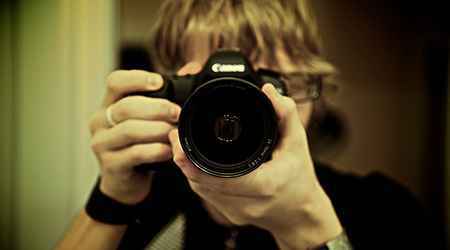How To Start A Small Photography Business

Starting a small photography can be a great way to turn a hobby into a profitable endeavor. The size of your photography business will depend on how much money you're willing to invest in equipment and how much time you're willing spend on attracting business and letting potential customers know you can service their photographic needs. The only difference between a small photography business and many other types of small businesses is understanding the specific needs of the customer base and focusing on a particular niche that interests you.
For a small business dedicated to photography, it is best to focus on an area of interest which you can see yourself doing day in and day out. The most common types of niche photography from a business perspective include shooting weddings, portraits and going freelance for newspapers and online publications. It is important to determine which type of niche photography you are interested in early on because your equipment will need to be tailored for specific activities and not all cameras and lenses can be used universally. Fast action like sports photography require more expensive equipment such as telephoto lenses and cameras which can shoot high ISO images at a fast rate. Portrait photography can use a less expensive full frame camera but will require lenses of very high quality and very low apertures. Since the equipment will be the single most expensive costs for this type of business, smart buying decisions early on will save significant headaches later during day-to-day operations.
Once you've decided on your niche, starting a small photography business is just like any other small business with regards to daily operations and traditional marketing techniques. If you have no active clients you can use traditional networking and word of mouth to attract customers. Speak with family and friends as well as coworkers to let them know you're open for business. Business cards, brochures and a website are all required so current and potential clients will have access to your contact information and are able to view your portfolio online. You will also need some sort of small business accounting software to ensure you're properly tracking purchases as well as calculating sales tax and revenue.
The Internet has become a wonderful outlet for individuals interested in photography and in turn making a profit from their hobby. Prior to the Internet, photographers would have to compete for clients like every other small business. Now with sites like Flickr, iStockPhoto and Corbis you can turn your downtime into another source of revenue. When not shooting weddings or portrait session you can shoot stock photography for businesses or landscape photography for publications and sell them on stock photo websites. This allows you to work 24 hours a day 365 days a year if you so choose and create additional revenue streams which make money even when you go back to working with clients.
Make sure your business is properly licensed and that you are paying all applicable taxes to ensure compliance with state and federal law. You may also want to consider hiring financial and legal professionals to provide additional guidance should your business become more successful than expected. These professionals may be able to make important suggestions about deductions or various legal protections regarding customers. Starting a small photography business is easier than most other businesses since it requires little initial capital for equipment and overhead. You can easily start working from your home and move into a retail space later on should the need arise. Your success in commercial photography will be based on the quality of the product you produce and the prices you charge. Be sure to do your research and check out the competition to ensure you're charging a fair market price for your service.







